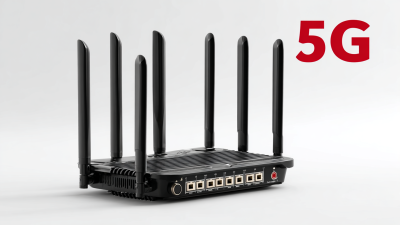As the world rapidly shifts towards a more connected future, the advent of 5G technology is poised to revolutionize mobile internet access like never before. According to a recent report by the Global Mobile Suppliers Association, the number of global 5G subscriptions is expected to exceed 1.7 billion by 2025, highlighting the increasing reliance on high-speed mobile connectivity. A significant catalyst for this transformation has been the emergence of 5G SIM routers, which are enabling seamless connectivity across various devices and locations.

Industry expert Dr. Emily Johnson, a leading figure in telecommunications research, emphasizes the impact of 5G SIM routers on consumer accessibility. She notes,
“5G SIM routers are not just a luxury; they are becoming essential tools for bridging the digital divide for everyone, enhancing both personal and professional connectivity.”With their ability to deliver ultra-fast internet speeds and robust connectivity options, these devices are set to empower individuals and businesses alike, revolutionizing how we access and utilize the internet in an increasingly mobile world. As we explore the profound implications of 5G SIM routers, it is clear that they are shaping the future of mobile internet access for everyone.
The rise of 5G technology is fundamentally transforming mobile internet access around the globe, reaching new heights in connectivity and speed. As 5G sim routers become increasingly prevalent, users can experience enhanced mobile gaming, streaming, and overall data-heavy applications without the frustration of lag or bandwidth limitations. This advancement is particularly impactful for professionals and gamers alike, allowing seamless interaction in real-time scenarios and providing a more immersive experience than ever before.
Furthermore, analysts predict that the global skill gaming market will see explosive growth, skyrocketing from $40.69 billion in 2024 to an astonishing $1001.97 billion by 2032, with a compound annual growth rate of 11.9%. This surge can be attributed to the rapid adoption of 5G technology, which not only supports richer content delivery but also broadens access for users worldwide. As 5G networks continue to expand, they will play a crucial role in shaping the future of mobile internet access, ultimately enhancing user experiences across various sectors.
The advent of 5G technology marks a significant leap forward in mobile internet access, particularly when compared to its predecessor, 4G. According to a report by the Global Mobile Suppliers Association, 5G networks can achieve download speeds of up to 10 Gbps, which is nearly 100 times faster than the typical 4G speeds ranging from 20 to 100 Mbps. This radical increase in speed not only enhances user experience but also enables a wide range of applications that were previously impractical, such as real-time remote surgeries and augmented reality gaming.
Moreover, the latency improvement with 5G is noteworthy. While 4G networks often suffer from latency issues of around 30-50 milliseconds, 5G can reduce this to as low as 1 millisecond. This reduction is crucial for applications that demand instantaneous feedback, such as autonomous vehicles and industrial automation. According to a study by the International Telecommunication Union, the low latency and enhanced bandwidth provided by 5G have the potential to unlock new economic opportunities, estimated at $13.2 trillion by 2035, emphasizing the transformative aspect of 5G SIM routers in the landscape of mobile internet access for users worldwide.

The advent of 5G SIM routers is reshaping mobile internet access, particularly for remote workforces. According to a report by the International Telecommunication Union, over 60% of professionals now work remotely at least once a week, and the demand for reliable, high-speed internet has never been greater. 5G SIM routers, leveraging enhanced capabilities of fifth-generation networks, deliver robust connectivity that is crucial for seamless collaboration and productivity in a remote environment.
These routers provide speeds that can exceed 1 Gbps, allowing for efficient video conferencing, large file transfers, and real-time collaboration without the lag often associated with 4G networks. Moreover, a study from OpenSignal indicates that users experience about 20% faster upload and download speeds with 5G, significantly improving workflows. This connectivity is essential for remote teams, as it enables them to connect from virtually anywhere, thereby supporting a flexible work culture and enhancing overall job satisfaction. With the ability to connect multiple devices simultaneously, 5G SIM routers empower organizations to optimize their operations, regardless of geographical constraints.
This chart illustrates the improvement in mobile internet access facilitated by 5G SIM routers. The average download speed has increased significantly after the deployment of 5G technology, and the latency has considerably reduced, enhancing the overall connectivity experience for remote workforces.
The adoption of 5G SIM routers is poised for significant growth, with predictions suggesting an expanding market through 2025. As 5G technology becomes more accessible, the demand for reliable mobile internet solutions is driving this revolution. With the proliferation of devices demanding high-speed connectivity—ranging from smartphones to IoT devices—5G SIM routers stand at the forefront of this transformation, enabling seamless streaming, gaming, and other data-intensive applications.
Market analysts project that sectors related to mobile hotspots and cellular modems will experience impressive growth rates. The mobile hotspot router market alone is expected to increase from USD 10.1 billion in 2025 to USD 46.9 billion by 2035, demonstrating a CAGR of 16.6%. Similarly, the cellular modem market is set to expand significantly, fueled by the rapid rollout of 5G networks and the widespread adoption of M2M devices. This trending growth reflects not only the immediate consumer needs but also the long-term technological advancements that will shape the future of communication.

The advent of 5G SIM routers is set to benefit various user demographics, significantly reshaping mobile internet access. According to a report by GSMA, the number of global mobile subscribers is projected to reach 5.3 billion by 2025, indicating a surging demand for faster and more reliable internet. Among those who stand to gain the most are remote workers and small businesses. With 5G’s low latency and high-speed capabilities, these users can experience seamless video conferencing and efficient cloud services, enhancing their productivity in ways that were previously unattainable with older technologies.
Moreover, young adults and tech-savvy individuals are also reaping the benefits. A survey by Ericsson suggests that connectivity is a top priority for consumers aged 18-34, with 70% stating that they require stable internet access for streaming, gaming, and social media. This demographic is particularly drawn to the flexibility offered by 5G SIM routers, allowing them to stay connected on the go without relying on fixed-line broadband.
Tips: When selecting a 5G SIM router, consider factors such as coverage, speed, and data plans. Make sure to check user reviews and performance benchmarks specific to your area. Additionally, keep an eye on promotional offers as many service providers are incentivizing early adopters with competitive rates.








